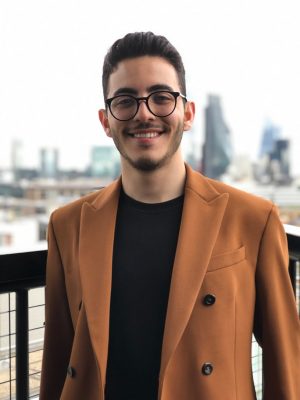Q&A with Fouad Abu-Hijleh, Global Health MPH Candidate, Digital Health Researcher

Fouad Abu-Hijleh
What was your background before enrolling in the MPH program?
Before enrolling in the MPH program, I attended UNC Chapel Hill for my undergraduate studies in Chemistry and Medical Anthropology.
Will you tell us more about your MPH practicum?
I worked for the Health Care Accreditation Council (HCAC) in Amman, Jordan. HCAC is Jordan and the region’s only ISQua accredited organization dedicated to improving the quality of healthcare services and promoting patient safety through accreditation, consultation, and capacity building. My role was mainly to conduct gap analyses focused on the communication and M&E strategies deployed by the organization to create an action plan and future recommendations. During my time at HCAC, I had the privilege of working alongside some highly experienced public health professionals across the public and private sector who are working together towards ensuring a safer and higher quality healthcare infrastructure in Jordan.
Can you tell us more about your position as a Digital Health Intern at the Bureau for Global Health at USAID?
I first started working in digital health back in January under Dr. Manish Kumar and Liz Millar at the Carolina Population Center on developing The Navigator for Digital Health Capability Models. After I wrapped up my work at CPC, I heard about the Digital Health Internship, which is part of the STAR program that is run jointly between USAID’s Global Health Bureau and the Public Health Institute in Oakland, CA. My main role is to support the digital health team implement the strategies laid out in USAID’s Digital Health Vision. Given that the digital health desk is housed under the Center for Impact and Innovation, I also have the opportunity to learn about various other projects in global health.
What does “global health” mean to you?
The cliché answer would be to say that in public health, global is local and vice versa. I’m not against deploying cliches when I see their validity. The COVID-19 pandemic has proven this central dogma of public health to be true. Global health transcends the superficial dividers around which the modern world and its constituent nation states organize. A virus knows no borders, no race, no class. Global health, then, is the international effort to mobilize as a united front to combat threats to environmental, animal, and human health.
Can you tell us more about co-authorship on the publication “Assessment of a Crowdsourcing Open Call for Approaches to University Community Engagement and Strategic Planning During COVID-19“?
After virtually graduating from undergrad at UNC back in May 2020, I spent most of my summer in Chapel Hill trying to decide if I was going to stay in town for the first year of my MPH. At the time we were set to go back to in-person classes in August, so an impromptu group of UNC faculty and students got together to create Carolina Collective, an open call and competition for safe campus reopening suggestions. After we went through the 80+ submissions and selected the prize winners, we were left with a sizable pool of qualitative data that we used to write our paper on using open calls as a way to engage community members in university strategic planning during COVID-19. Dr. Rohit Ramaswamy, who later turned out to be my faculty mentor, was also part of this research group.
What drew you to the Gillings School of Global Public Health?
I went to UNC for my undergraduate studies and many of my friends back then were pursuing their bachelors degrees at Gillings. I was impressed with the work that they were doing and that pushed me to look further into continuing my studies at the school of public health. There’s no arguing that the Gillings MPH is well-respected and highly ranked, but it is also much more affordable than other programs that I was considering. I also gravitated towards Gillings due to their focus on global health, which is important to me.
What is your dream job?
I’d be lying if I said I knew. I just know that I want a job that allows me to constantly evolve and learn new things. Ideally, I’d be able to combine my passion for public health and science with my love for travel. Later in life, I’d love to commit some time to the improvement of the public health sector back home in Jordan. There is so much untapped potential and unemployed talent in Jordan, and I want to help change that.
What is your comfort food?
My comfort food is Shishbarak, it’s a popular dish in the Levant that consists of lamb or beef dumplings in a cooked yogurt sauce.
